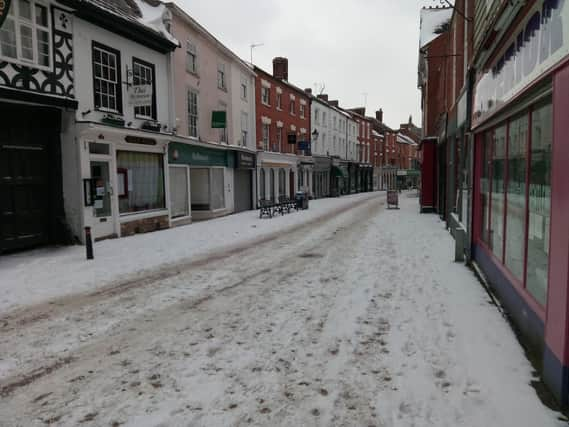Will we get a white Christmas in 2020? Banbury council is looking for snow wardens to help keep us safe


The last widespread snow on Christmas Day was in 2010 but the TWO expertssay this year may be the next because the chance of north-westerly weather flows is elevated. Generally these bring cold conditions to the UK in the winter months with the greatest risk of snow.
While our seasonal traditions include snow at Christmas and we love the thought of it, snow and frost can pose real problems.
Advertisement
Hide AdAdvertisement
Hide AdOver the past seven years Banbury Town Council has accumulated a list of around 100 volunteer snow wardens - neighbourly men and women who organise the gritting of roads and pavements outside their own and their neighbours’ homes on snowy or frosty mornings. However more are needed.
The call has gone out again for public spirited residents who will keep roads where they live free of snow and ice. Businesses in the town can get involved by gritting pavements outside their shops and offices. And enlisting now will allow time for training and the organisation of equipment.
Cllr Kieron Mallon, leader of the council, said: “Snow wardens are valued members of society. They keep roads, pavements and footpaths safer for everyone throughout the winter - particularly elderly and vulnerable residents who cannot help themselves. Wardens help keep the town moving at times when snow or frost could restrict travel to and from work, schools and shops.
"Councils do their best to keep roads and pavements safe but most people realise gritting lorries cannot get everywhere instantly. On-the-spot volunteers can act straightaway.”
Advertisement
Hide AdAdvertisement
Hide AdThe council supplies everything the volunteers need and also provides training for the role. If you could be a snow warden, contact Mike Hall at [email protected]
A Met Office spokesman said: "We can accurately forecast if snow is likely on any given Christmas Day up to five days beforehand. In terms of the statistical likelihood of snow based on climatology, we know that a snowflake has fallen somewhere in the UK on Christmas Day 38 times in the last 54 years, so we can probably expect more than half of all Christmas Days to be a 'white Christmas'.
"However, the Dickensian scene of widespread snow lying on the ground on Christmas Day is much rarer. There has only been a widespread covering of snow on the ground (where more than 40 per cent of stations in the UK reported snow on the ground at 9am) four times in the last 51 years.
"The last widespread white Christmas in the UK was in 2010. It was extremely unusual, as not only was there snow on the ground at 83 per cent of stations (the highest amount ever recorded) but snow or sleet also fell at 19 per cent of stations. We also had a white Christmas in 2009 when 13 per cent of stations recorded snow or sleet falling and 57 per cent reported snow lying on the ground."
Advertisement
Hide AdAdvertisement
Hide AdFor many of us, snow is synonymous with Christmas. Bing Crosby famously dreamt of it, while movies, advent calendars and Christmas cards are all decorated with snow-filled scenes of a white Christmas, the Met Office says.
However, for most parts of the United Kingdom, Christmas is only at the beginning of the period when it's likely to snow. We are more likely to see snow between January and March than in December with snow or sleet falling an average 3.9 days in December, compared to 5.3 days in January, 5.6 days in February and 4.2 days in March.
White Christmases were more frequent in the 18th and 19th centuries, even more so before the change of calendar in 1752 which effectively brought Christmas Day back by 12 days. Climate change has also brought higher average temperatures over land and sea reducing the chances of a white Christmas.